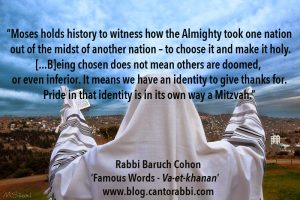
FAMOUS WORDS – Va-et-khanan—Deut. 3:23–7:11, by Rabbi Baruch Cohon
This week we will observe Shabat Nakh’mu, the Sabbath of Comfort, taking its name from our Haftorah, to help us recover from the tragedies that marked Tisha B’Av. This week’s Torah reading, however, is not about comfort. In fact, Moses is reviewing our people’s experiences and charging us with loyalty, responsibility, courage, and principles of conduct – none of which promise great comfort, but all direct his listeners on the path he lays out. In the opening lines of our Sedrah, he recalls his prayer that G-d should let him lead his people into the Promised Land. At age 120, he is not ready to quit. But he is denied. He tells the people: “I will die in this land; I will not cross the Jordan. But you will go over and possess that good land.” No comfort for Moses, except the loyal and brave service of Joshua who will be his successor.
What we also get in this Torah reading are some words that are famous in other connections too. As one young student observed, Shakespeare is full of quotations – and so is the Torah, particularly here. A few examples:
In our Sedrah, Chapter 4 verse 4 is traditionally sung every Shabat when the scroll is brought to the reading desk: V’atem ha-d’veykim – “You who attach yourselves to the L-rd your G-d, all of you are alive today!”
Verse 35 appears in the prayerbook too, most impressively as it opens the Simchas Torah parade, when all the scrolls are carried around the synagogue: Atoh horeyso lo-daas – “You were shown, in order to know, that the L-rd is G-d and there is none else beside Him.”
Verse 44 is sung whenever the Torah reading finishes with the act of lifting the scroll high so everyone can see the writing in it: V’zos haTorah asher sam Moshe – “This is the Torah that Moses placed before the people of Israel,” and then of course the prayerbook adds further famous words.
Most famous of the passages we quote from this Sedrah include Chapter 5, verses 6-18. This is a repetition of the Ten Commandments, not quite verbatim from the Book of Exodus, but almost. Whether full text or abbreviated or symbolized by the two tablets, these words preach their message of right and wrong in houses of worship and in courthouses far and wide.
And Chapter 6 verse 4 is what every observant Jew is taught to repeat morning and night – the Sh’ma—“Hear, Israel. The L-rd is our G-d, the L-rd alone.” Followed immediately in 5-9 with the first paragraph of that basic principle of Judaism: V’ahavta –“Love the L-rd your G-d with all your heart, with all your soul and with all your might.”
Verse 21 of this chapter includes a line that appears in every Passover Haggadah: Avadim hayeenu – “We were slaves to Pharaoh in Egypt.” In fact our Sedrah sets out the whole theme of the Pesach Seder, when it says in verse 20: “when your son will ask you…” again repeating the family conversation from Exodus. There the kid just asks “What’s this?” Here he goes into detail: “What are the testimonies, the ordinances, the judgments…” prompting the rabbis to define the Exodus youngster as the simple son, and this one as the wise son. Be ready to answer both!
Many famous words here, no question about that. For this year’s reading, however, let’s look at another passage.
Towards the end of the reading, in Chapter 7, Moses calls us Am Kadosh – a holy nation. And he says: “[Only} you did G-d choose from all the nations of the earth to be His special people.” On what basis does Moses conclude this Divine choice was made? “Not because you were more numerous than all the other nations, did G-d desire you and choose you, for you are the fewest of all the nations. But G-d loved you and kept the oath He swore to your ancestors to bring you out and redeem you with a mighty hand. He redeemed you from the home of slavery, from the hand of Pharaoh, king of Egypt.”
Moses holds history to witness how the Almighty took one nation out of the midst of another nation – to choose it and make it holy. Looking at our history from Moses’ time until now, we must face the fact that individually and collectively our people repeatedly proves its Divine choice. Despite our tragic losses as the “fewest,” we survive and we progress. Our current enemies may want to wipe us out, but they won’t. Nobel prizes, startup industries, topflight arts and literature, or sacred truths – you name it, we are there. No, being chosen does not mean others are doomed, or even inferior. It means we have an identity to give thanks for.
Pride in that identity is in its own way a Mitzvah. Let’s observe it.


